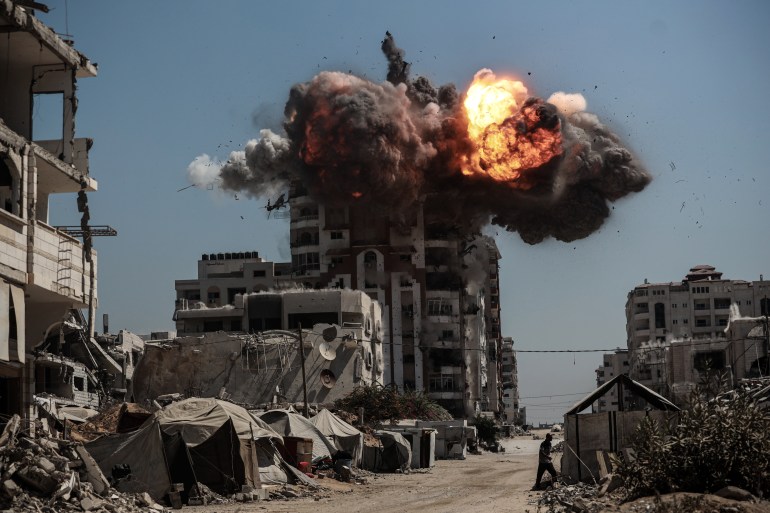
Israel flattens more Gaza towers as strikes kill 53 and famine toll rises | Arab League News | Al Jazeera

Intensified Strikes in Gaza: A Humanitarian Crisis Deepens
The ongoing conflict between Israel and Hamas has escalated dramatically, with Israeli forces intensifying their bombardment of Gaza City, resulting in the destruction of residential towers and significant civilian casualties. Reports indicate that at least 53 Palestinians have died in the latest wave of strikes, with the humanitarian situation deteriorating rapidly as famine conditions worsen.
Destruction and Displacement
Israeli airstrikes have targeted multiple areas in Gaza, including residential blocks that have been reduced to rubble. The Israeli military has justified these actions by claiming they are aimed at Hamas and other armed groups. However, humanitarian organizations and local authorities argue that the strikes are indiscriminate, impacting schools, hospitals, and civilian infrastructure.
A statement from Gaza’s Government Media Office condemned the systematic bombing of civilian structures, asserting that the occupation is deliberately targeting essential services and institutions, including those providing humanitarian aid. This perspective is echoed by many residents who are facing dire conditions. One displaced Palestinian, AbedAllah Aram, described the severe shortage of clean water and food, highlighting the urgent need for shelter as winter approaches.
Voices from the Ground
The emotional toll on families in Gaza is profound. One individual shared a harrowing account of their family’s plight, saying, “Not only are missiles raining down on us, but famine is devouring us too.” This sentiment reflects the desperation felt by many who have been displaced multiple times over the past two years, struggling to find basic necessities as they navigate the ongoing violence.
Another resident, Ahmed Awad, recounted his escape from northern Gaza under heavy fire, arriving in a new area only to find a lack of basic services such as water and sanitation. He described the scene as “extremely dire,” with families sleeping outdoors and facing an uncertain future.
Regional and International Reactions
The situation in Gaza has sparked widespread condemnation across the Arab world. Arab League Secretary-General Ahmed Aboul Gheit criticized the “silence and inaction” of the international community, which he believes has allowed Israel to carry out its operations with impunity. He called for Arab nations to hold Israel accountable for what he termed “evidenced war crimes,” including civilian casualties and forced displacement.
Moreover, the political ramifications of Israel’s military actions are being felt beyond Gaza. Israeli Prime Minister Benjamin Netanyahu has publicly stated that ties with the United States remain strong, despite concerns over recent strikes that targeted Hamas negotiators in Qatar. Reports indicate that U.S. Secretary of State Marco Rubio is working to manage the fallout from these events, emphasizing the importance of maintaining strong relations with Israel.
Humanitarian Crisis Worsens
The humanitarian crisis in Gaza has reached alarming levels, with the United Nations recently declaring a famine. According to the enclave’s Health Ministry, at least 144 Palestinians, including 30 children, have died from hunger-related causes since the famine was declared. The situation is further compounded by ongoing airstrikes, which have forced families to flee south towards areas designated as “safe zones,” despite reports of continued attacks in these regions.
UNICEF spokesperson Tess Ingram noted that conditions are deteriorating daily, stating, “Nowhere in Gaza is safe, including in this so-called humanitarian zone.” The increasing crowding in camps and the lack of basic supplies are pushing the population to the brink of survival.
The Political Landscape
The conflict has also led to heightened tensions in the region. Izzat al-Rashq, a member of Hamas’s political bureau, accused Netanyahu of attempting to reshape the Middle East through aggressive military actions. This sentiment is echoed by analysts who warn that the ongoing violence could destabilize the entire region.
Additionally, Adnan Hayajneh, a professor of international relations at Qatar University, pointed out that the U.S. must recognize the broader implications of the conflict, stating that 2 billion Muslims worldwide feel insulted by the ongoing violence and that this could lead to further destabilization.
Conclusion
As the conflict continues, the humanitarian situation in Gaza remains critical. With thousands of families displaced and facing severe shortages of food, water, and shelter, the international community is being called upon to take action. The ongoing violence and political maneuvering not only threaten the lives of those in Gaza but also have the potential to destabilize the entire region.
Key Facts
– Israeli airstrikes have killed at least 53 Palestinians, including 35 in Gaza City.
– The United Nations has declared a famine, with at least 144 deaths attributed to hunger, including 30 children.
– Displaced families are facing severe shortages of clean water and food, with winter approaching.
– Arab League Secretary-General Ahmed Aboul Gheit has condemned Israel’s actions as “war crimes.”
– Israeli Prime Minister Benjamin Netanyahu insists U.S.-Israel relations remain strong despite international criticism.
Source: www.aljazeera.com
